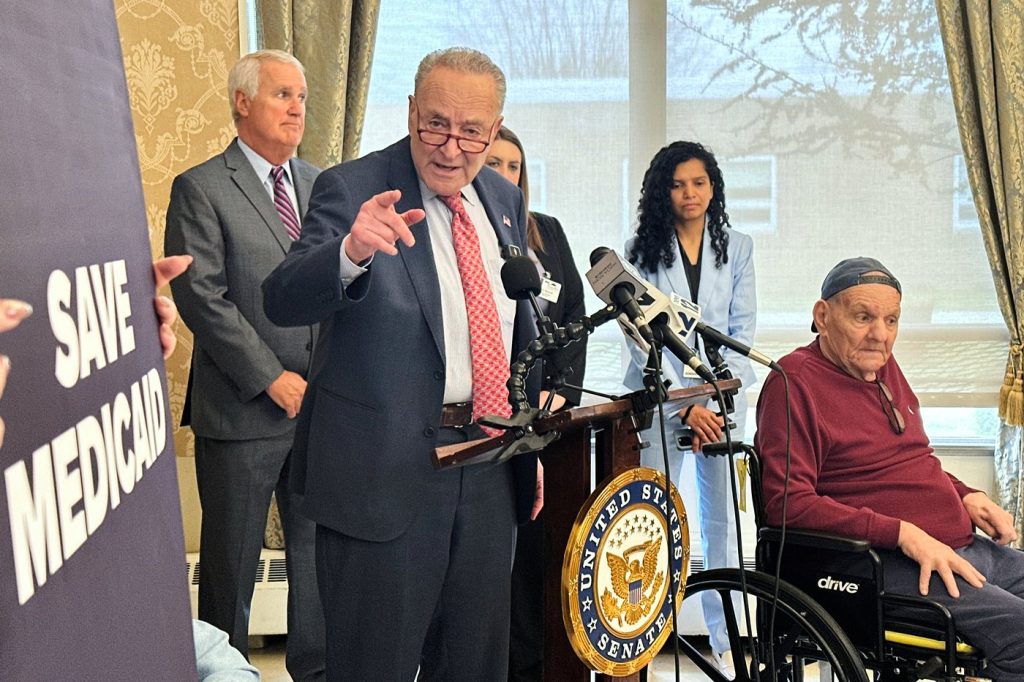HUNTINGTON, N.Y. — In a recent strategic move, Senate Majority Leader Chuck Schumer has embarked on a focused campaign aimed at Republican-held districts, particularly in Trump-friendly areas, as part of an effort to reshape the Democratic narrative regarding federal spending. This plan reflects a more aggressive approach where Democrats position themselves as protectors of essential social safety nets, especially in light of looming Republican-led cuts to programs like Medicaid.
On Monday, Schumer visited two nursing homes—one in Staten Island and another in suburban Long Island—to highlight potential catastrophic impacts of proposed Medicaid cuts that Republicans support. The choice of these venues is intentional, as both nursing homes are located in congressional districts represented by GOP members who have largely adhered to former President Donald Trump's policies. Schumer emphasized the real-world implications of budget discussions, stating, "We talk about the big budget issues in Washington, but they affect real people," underscoring the importance of these issues for vulnerable communities.
This initiative is not merely routine outreach; it signifies a strategic pivot for Democrats as they prepare for the crucial midterm elections. Schumer's campaign strategically targets suburban and swing voters, aiming to reclaim ground on fundamental issues that resonate deeply with American families. The focus on Medicaid is a potent tool for Democrats, bringing attention to the direct consequences of Republican austerity measures and contrasting them with the needs of Americans reliant on these services.
Schumer remarked on the need for persistence in this approach, stating, "It’s not going to work in one day," but emphasized that sustained effort would yield results. The Democratic strategy centers around a unified message that links Trump and the Republican Party to the growing financial burden on middle-class families, exacerbated by cuts to healthcare and social security. This narrative serves to unite Democrats across the ideological spectrum, from progressives to moderates, while also appealing to a broader voter base.
The current tour of Schumer is also a response to recent internal struggles within the Democratic Party over government spending priorities and aid to Ukraine. Progressive critiques have called for more decisive leadership, prompting Schumer to take an offensive stance rather than retreat. He is attempting to organize Senate Democrats into a cohesive voice advocating for the middle class against Republican policies perceived as favorable to wealthy constituents.
In this endeavor, Schumer refers to his team as an "orchestra," with various senators like Chris Murphy and Cory Booker contributing to the national outreach strategy. The Democratic digital campaign is ramping up its efforts as well, engaging influencers and community leaders to amplify party messaging. Schumer has noted the lessons learned from prior electoral campaigns, indicating a more strategic approach to digital outreach moving forward.
Ultimately, Schumer's active campaigning seeks to redefine the stakes of the upcoming elections early on, striving to establish a stronger connection with constituents even in historically Republican territories. Through consistent engagement and a clear message, Democrats hope to sway public perception and reduce the impact of Trump's enduring appeal within the party. The emphasis is on shaping the conversation around federal spending and social services, with a clear objective of positioning Democrats as defenders of vital programs crucial for the middle class.










